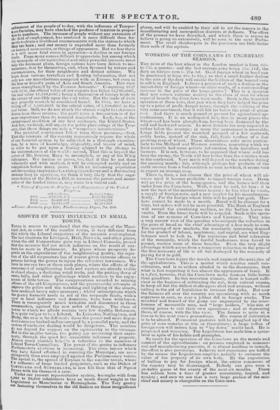WORKING OF TIIE CORN-LAWS IN UNCERTAIN SEASONS.
THE price of the best wheat in the London market is from 66e. to 73g. a quarter; and the last average price being 39s. I Id., the
duty on foreign corn i 27s. 8d. God foreign wheat in bowl can be purchased at from 40e. ta 45s.; so that a small further decline in the rate of the duty will enable the behlers of the bonded corn to sell it in England. Is there a prospect of such a decline in the import-duty of foreign wheat—in other words, of a corresponding increase in the price of the home-grown ? This is a question that now causes extreme anxiety to the class of men for whose especial benefit the Corn-laws were made. Such is the beautiful operation of those laws, that just when they have helped the price up to a point of profit, danger arises, through the working. of the very same enactment, that it will fall far below the point of prime cost. And there is muck ground at present for agricultural ap- prehensions. It is an undisputed flirt, that in many places the wheat-seed has been ploughed-up, having been destroyed by the cold and backward season. In most districts the crop expected is rather below the average ; in many the appearance is miserable.
Large fields present the wretched prospect of a few scattered, sickly herbs, instead of the rich, full, thick verdure of a fine growing crop of wheat. These observations refer mere particu- larly to the Midland and Western counties, respecting which we have recently had sonic private information from travellers and
farmers. It is not, however, to be supposed that where cold has been the enemy, the North will fare better than the counties more to the southward. Very much will depend on the weather during the ensuing month ; but, although perhaps few products of the earth recover from a bad condition SO S0011 as wheat, it seems vain to expect an average crop.
There is, then, a fair chance that the price of wheat will ad- vance until it become profitable to import foreign corn. Down will go the price of the home-grown, and the farmer will then
suffer from the Corn-laws. Well, it may be said, let him : it is now the turn of the manufacturer to gain : he has what he %%ants, a supply of foreign corn, and a new market for his manufactures. Softly. For the foreign wheat little will be paid but gold. Mar- kets cannot be made in a month. Bread will be cheaper for a time, but orders will not be more plentiful. The Bank of England will curtail the circulating medium, as the 'bullion leaves its vaults. Even the home-trade will be crippled. Such is the opera- tion of our systems of Corn-laws and Currency. They take a very narrow view of the question who estimate the reduction in the price of bread as the chief advantage of a free trade in corn. The opening of new markets, the constantly increasing demand for the product of labour, machinery, and capital, arc what Eng- lishmen need to look to. The capricious and brief relaxation of the monopoly, which the fearful landowners were forced to permit, confers none of these benefits. Even the very slieht advantage which arises from a temporary reduction in the price of the first necessary of life is all but destroyed by the necessity of paying for it in gold.
The Corn-laws injure the morals and augment the anxieties of the agriculturiste. Tlmis is a matter which receives small con- siderution, and is so seldom alluded to in the discussions, that what is fect respecting it has almost the appearance of fancy. It is a fact, however, that the Corn-laws make farmers little better than gamblers. In this uncertain climate, there is hazard suffi- cient in the business of cultivating the soil, from natural causes, to keep all but the dullest clodhoppers alert and anxious, without calling in the aid of legislation to increase the risks. But now the farmers all over the country are speetilating with as much eagerness in corn, as ever a jobber did in foreign stocks. The mischief and hazard of the game are augmented by the inter- ference of mercantile men, and "large holders," who aim at raising prices to suit their own operations ; and at depressing them, of course, with the like view. The farmer is quite at a loss as to his next year's proceedings. His course of cultivation is to be altered. Permanent pastures will be ploughed up if the price of corn remains at Gus. or thereabouts; a large influx of foreign corn will induce him to "lay down" arable land. He is perplexed and wavering. The Legislature has wade him a specu- lator in spite of his habits and principles. So much for the operation of the Cern-laws on the morals and comfort of the agriculturists: on persons employed in commer- cial and manufacturing pursuits, it is almost needless to remark, the effect is also pernicious. Industry and experience are battled by the means the Legislature employs unfairly te enhance the value of the property of its own body. By the exportation of bullion to pay for foreign wheat, the entire commerce of the country may be disarranged. Nobody can give even a probable guess at the events of the next six months. There has seldom been a time of greater uncertainty, hazard, and anxiety; and sure we are that a very large poitiun of the mis- chief and misery is chargeable on the Corn-laws.


























 Previous page
Previous page